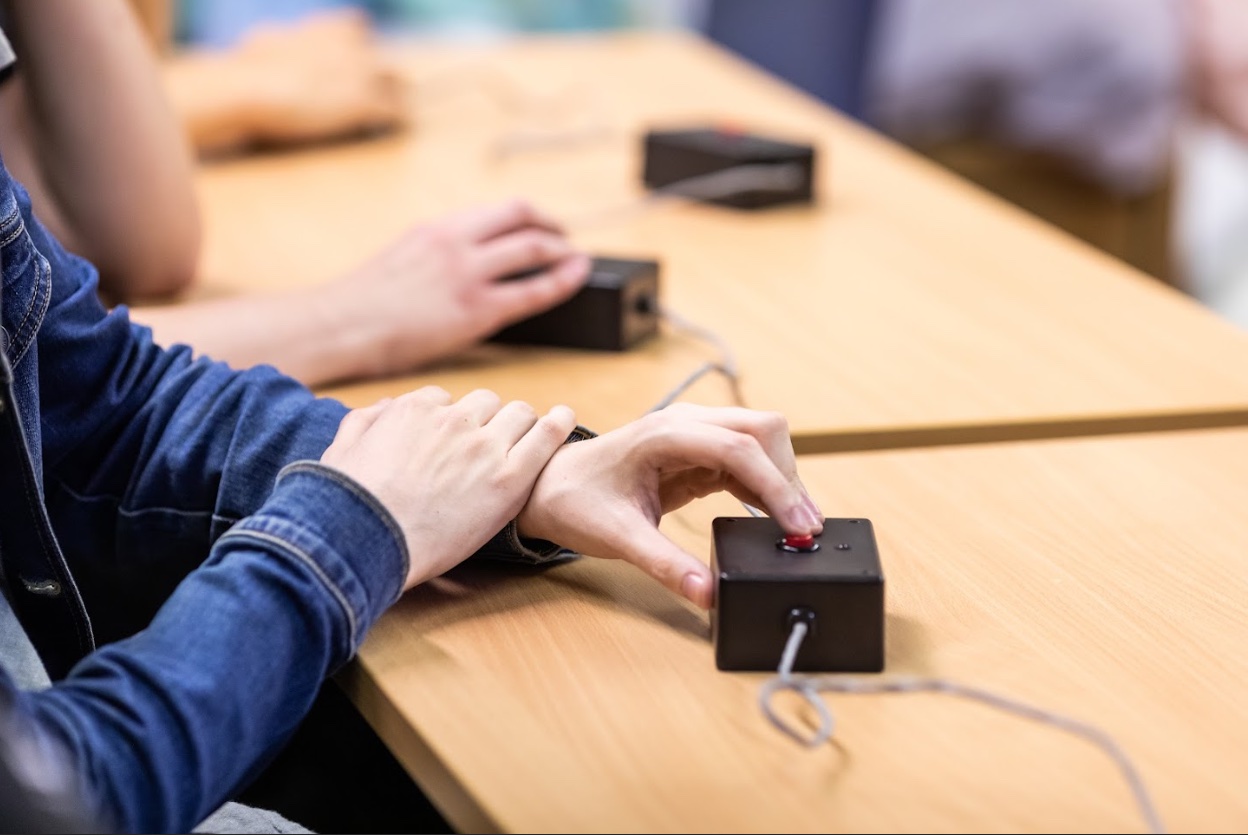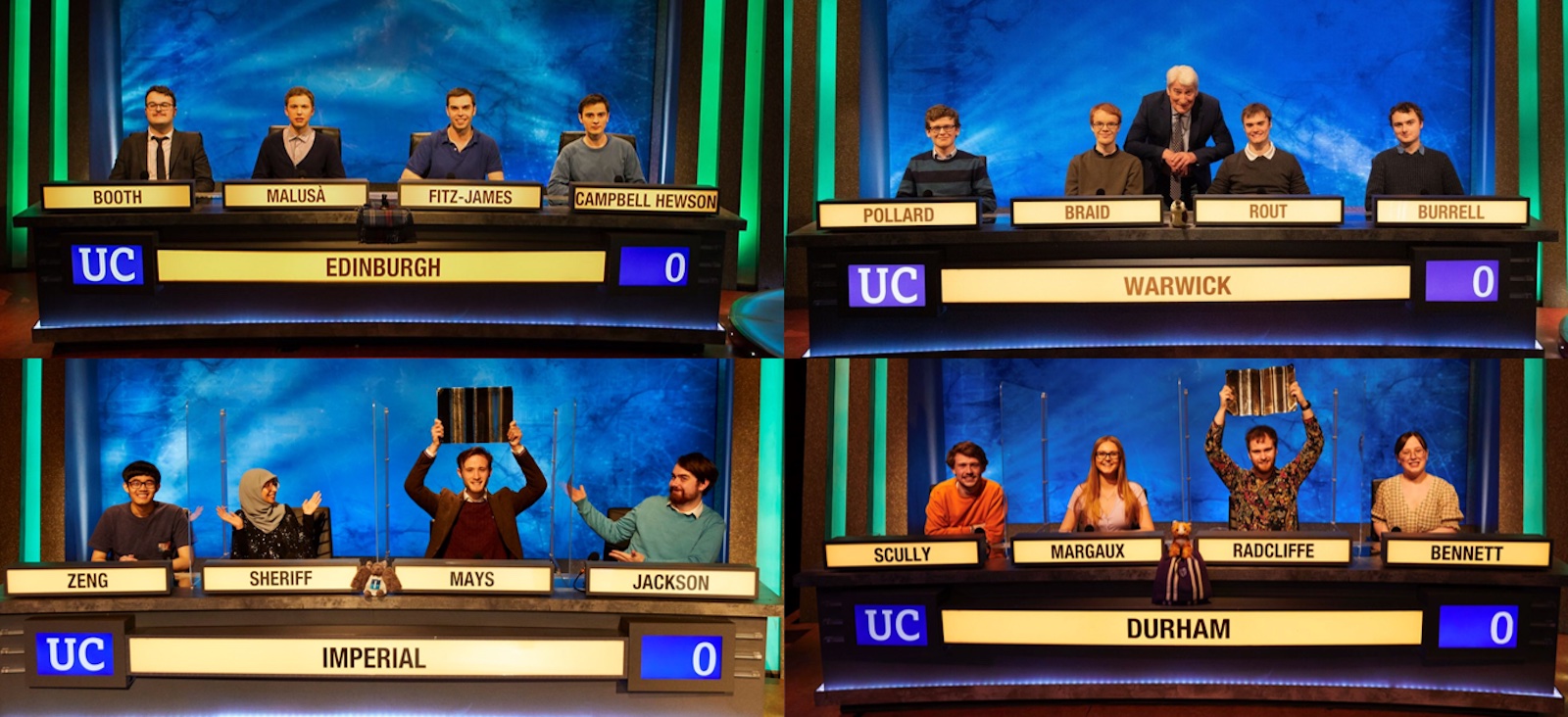Say you’re a students’ union, or part of a quiz society, or perhaps just a fan of the show, and you want your university to win the big title: University Challenge series champions. What’s the best way of making sure that happens?
Well, you can’t guarantee it. No matter what you do, even if you get on the show there are a myriad different things that can stop a team, such as a starter question that swerves wildly, being beaten to the tiebreaker, being paired against an unstoppable team in the first round—some things just can’t be foreseen.
Nevertheless, there are some things you can do to improve your chances. Helping out with this article are two of the finalists from the 2022–23 series, Harry Scully (Durham) and Jacob McLauglin (Bristol); they have provided some of the key insights into the process of team selection, training and competing on the programme, as well as how quizbowl can make a crucial difference.
The role of quizbowl
You may have noticed that some universities are much more consistent in getting on to University Challenge and advancing into the rounds than others. What do, say, Imperial, Edinburgh and Manchester do that St Andrews, Nottingham and Leeds don’t?
One answer is quizbowl, the main form of inter-university quizzing that exists outside of University Challenge. For more information on the format, you can check out our ‘what is quizbowl’ page, but to summarise, it’s academic buzzer quiz played between teams representing universities. Originally from the USA, it has been played in the UK since 2010 and its correlation with University Challenge success is undeniable: the past twelve winning teams have all had at least one player who played quizbowl while at university. In more recent years there has been even more of an overlap between quizbowl players and University Challenge success, thanks to the growth in quizbowl’s popularity.
Both McLaughlin and Scully were no strangers to quizbowl when they were selected for their team, and they are unequivocal in saying that their quizbowl experience had been an asset for competing on the programme. For them, the most crucial aspect it helps in is with speed of recall—being able to connect the clues in the question to your own knowledge, being able to summon up the correct answer, and having the confidence to know that you have the answer in the starter question (as it is almost invariably performance on starters that decides the match). These are things that you can only really train by doing more buzzer quiz.
However, there is more to the process than just being interested in buzzer quiz—so let’s look into the process of selecting and training a prospective team, and find out how quizbowl can help there as well.
Building a team
Organising try-outs
Obviously, some form of competitive try-outs are important, but how do you find the right people? Most universities have thousands, if not tens of thousands of eligible students, so it’s not hard to imagine that there are five exceptional quizzers in there somewhere. So publicise as hard as you can—posters in all the buildings, ads in the student paper, getting your students union or even the university publicity team involved, and running multiple try-outs on different dates and campuses. Diversity in the team is important, given that this is something the show has struggled with in the past, and you should try to reach out to people who would not normally consider playing.
As for who runs the selections, Scully’s advice is that quiz societies should try to wrest control of the process; it’ll be much easier to write questions when there are people with a wide range of interests and specialisms who can contribute. Ideally, the previous year’s team should get involved with this process, so try to keep in touch with them. If there hasn’t been a team from your university for many years, try to find an interested staff member or students’ union officer to run things initially.
Internal selection
Practically all universities start try-outs with a written round of 50–100 questions that are read out and which people write their answer to. Sounds simple, but it’s not just the score that matters. Consider other factors such as the closeness of an incorrect answer, whether someone answers many questions that others didn’t, and what their specialisms are. You don’t want to find out at the next stage of selection that you’ve thrown out everyone who knew any art because their overall score was too low. It’s preferable that the questions are written in-house, rather than using the sample questions, for the sake of fairness and ensuring a broad range of topics are covered.
The next stage (or stages) of selection should be a buzzer round, similar in format to the programme. The goal is to get a sense of players’ individual strengths and what combination would work best together. Here is where quizbowl can come in useful for individuals seeking to take part, as that experience on the buzzer can prove advantageous in the try-outs.
As former participants, McLaughlin and Scully have both had experience with selecting a team, and their advice is the same—the single most important factor is subject coverage, which means that one shouldn’t simply pick the five highest scorers and call it a day. Very often the teams that advance furthest in University Challenge are the more balanced teams where every player has their own niche, rather than those with a single standout player or four generalists.
Official selection
All teams that apply to take part in University Challenge, reserve players included, are invited to do an interview and a general knowledge test by the producers. In this stage, questions are answered individually, without conferring, but a correct mark for one player is a correct mark for the whole team—hence the importance of having a team with varied specialisms and wide overall coverage.
However, it’s not as simple as “the best 28 teams make it on”. This part of the selection is very much up to the producers’ discretion; even if you submit the perfect team every year, you’re not guaranteed an appearance on the show. A team’s personality can be crucial at this stage, so it helps to build up some sense of camaraderie with your team and to genuinely be friends. The one thing any quiz should be, above all else, is fun.
Training and competing
Before filming
Don’t wait until you’ve found out if you’ll be going on the programme—start training as soon as the team is selected. Scully suggested that the first training session be dedicated to establishing the team’s strengths and weaknesses and distributing tasks on who should learn what. That said, both McLaughlin and Scully noted that trying to fill in gaps in knowledge isn’t always the best use of time. You might spend an hour a week cramming physics topics, but that could end up being useless against a team with physics students on it.
A lot of the learning you do as a team can take place after the try-outs. Scully pointed out that most of the buzzes he could remember were on topics he had actively tried to learn about, rather than randomly picked up at some point in the past. Carding—the deliberate rote-memorisation of topics for the sake of quiz—is not recommended for everyone, Scully admits, and it depends on an individual’s level of commitment.
The standard way for teams to train is to watch the current series and play along, trying to beat the teams on-screen. You could meet in-person and use a buzzer set, although if you’re unable to do this (e.g. due to travel constraints), you can use a site like Watch2Gether, which allows for videos to be watched and paused simultaneously by a group.
This kind of practice is best done with questions from the current series; as McLaughlin notes, these are the most valuable for practice, especially given how the style of the questions has changed over the past five years. That’s not to say that they don’t repeat themselves, and it’s not unusual for a contestant to have known the answer to a question solely because a similar one came up in the past.
University Challenge is filmed in short bursts at the end of February, March and April. With a four-week gap between rounds, that leaves plenty of time for more training. After their nail-biting first-round encounter, both Scully and McLaughlin recall stepping up their practices for the subsequent rounds. The gaps between filming also allow for teams to get a bit more crucial buzzer quiz experience outside of the programme.
Using quizbowl
A single quizbowl tournament will provide a team with more games than they could ever hope to get in a series of University Challenge filming. Nervousness on the buzzer has doomed many a team, and playing quizbowl can help overcome that, even if it won’t prepare you for the pressure of the cameras and studio lights.
 Quizbowl tournaments are invaluable for gaining the experience of answering questions on the buzzer while under pressure against an unfamiliar team.
Quizbowl tournaments are invaluable for gaining the experience of answering questions on the buzzer while under pressure against an unfamiliar team.
Take the 2020–21 Imperial team, for example. After their relegation to highest-scoring losers in their first round, they made an active effort to compete in quizbowl tournaments as a team. After the filming break, they came back fighting, squeaking past Exeter in the playoffs and eventually reaching the semi-finals. Things could have turned out quite differently without that extra experience.
If you’re from a university that’s trying out for University Challenge and is new to quizbowl, we would recommend sending a team to a quizbowl tournament, such as the British Novice tournament in late November (this year being held at both Durham and Imperial). There is also typically a novice-difficulty tournament held in January, as well as more difficult ones later in the term.
Keep in mind, quizbowl isn’t just for University Challenge hopefuls—any student can take part as often as they like, and the tournaments on offer have a range of difficulties. Even if your team is eliminated in the first round or never makes it on, you can still help to establish a lasting interest in buzzer quiz at your university, and quizbowl can serve as a way of motivating oneself to improve. This is what allows for a steady supply of strong players, as opposed to waiting for a dream team to come along by chance. Once you’ve got that, a series title is only a matter of time—and still a bit of luck.

